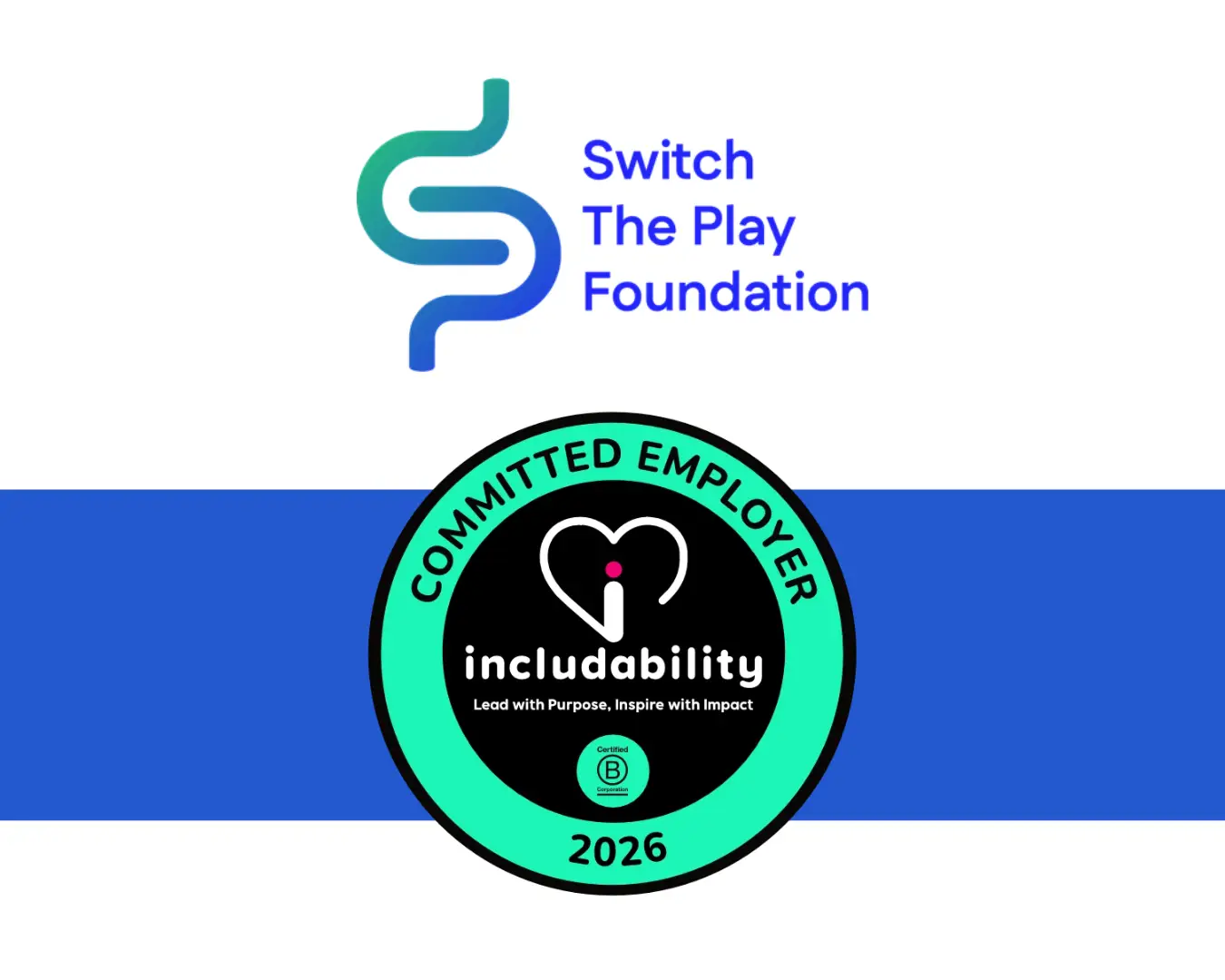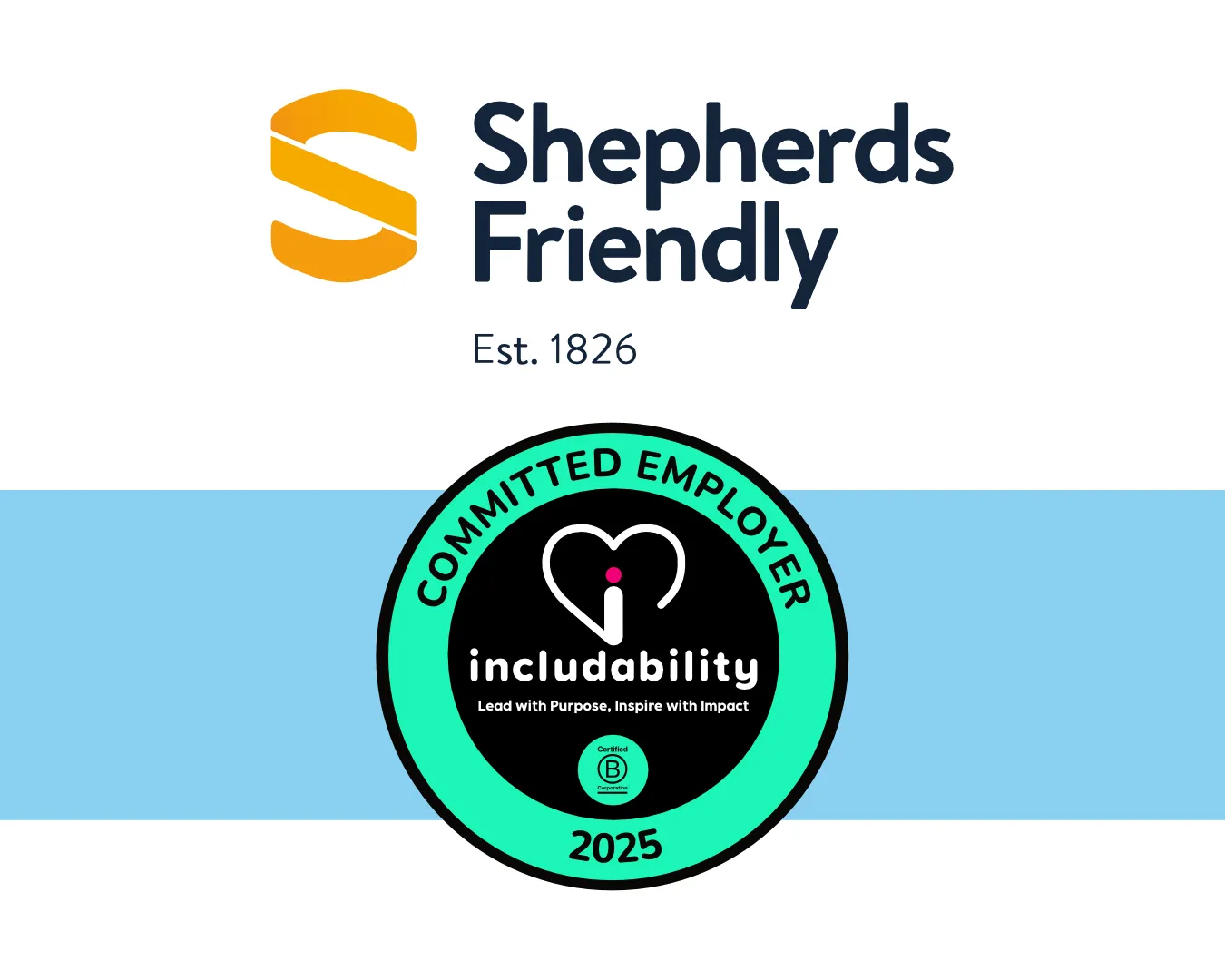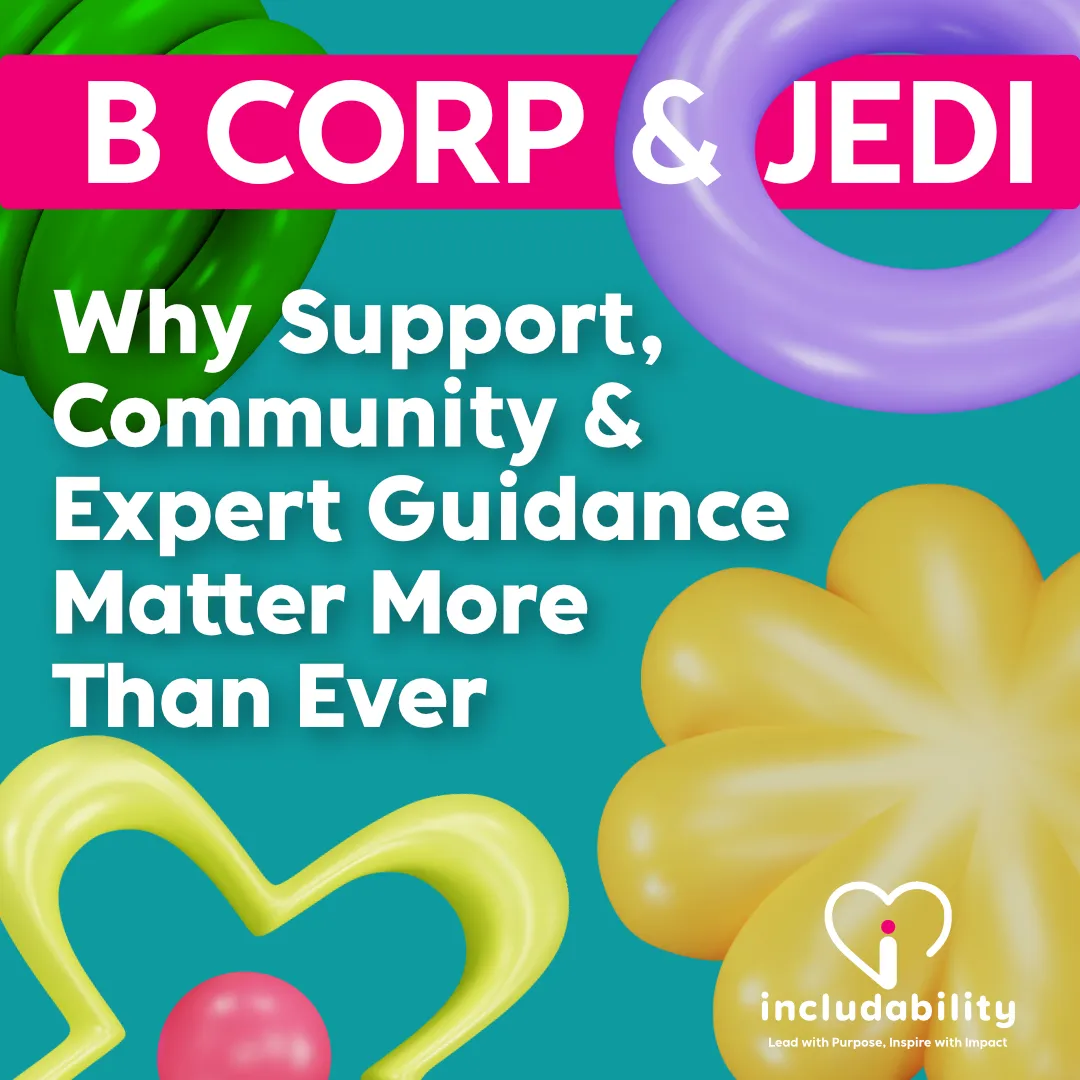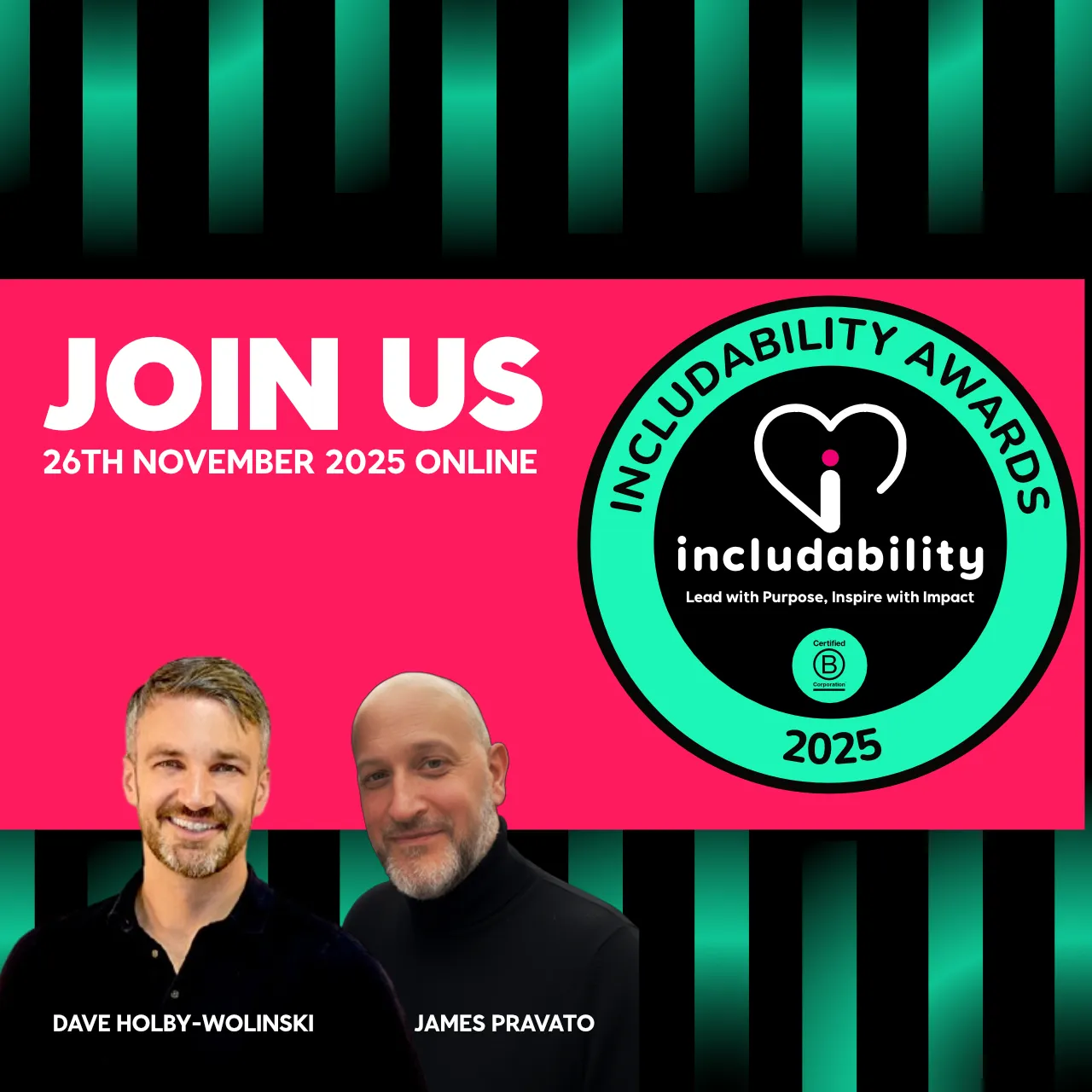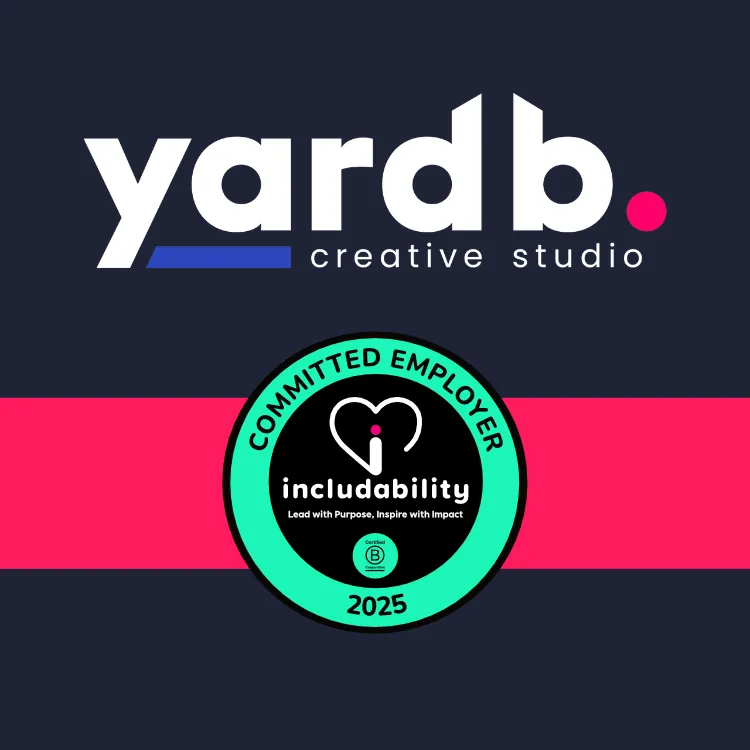What is Disability Pride Month?
Disability Pride Month is a time of celebration, empowerment, and advocacy for the rights and achievements of people with disabilities. It's a month dedicated to raising awareness, challenging stigma, and promoting inclusivity in all aspects of society.

Everything you need to know about the month-long awareness celebration

Disability Pride Month is a time of celebration, empowerment, and advocacy for the rights and achievements of people with disabilities. It's a month dedicated to raising awareness, challenging stigma, and promoting inclusivity in all aspects of society.
Our Includability Ambassadors explore the essence of Disability Pride Month, its significance, and how businesses can play a crucial role in fostering a disability-friendly workplace culture.
Discover how Includability can support your organisation in embracing diversity and accessibility.
What is Disability Pride Month?
Disability Pride Month is an annual observance held in July to celebrate the diversity and resilience of people with disabilities.
It's a time to recognise the contributions and achievements of individuals with disabilities, while also acknowledging the ongoing struggles and barriers they face in society. Disability Pride Month seeks to promote acceptance, inclusion, and equal opportunities for people of all abilities.
Disability Pride Month originated in the United States, where in 1990, the Americans with Disabilities Act (ADA) law was passed to prevent people with disabilities being discriminated against.
Up until this point, people with disabilities did not have the protection of law when they were treated equally and didn't have access to many of the same opportunities.
In the UK, Northern Ireland first introduced protections through legislation with the Disability Discrimination Act 1995, with England, Scotland and Wales passing a similar law in 2002 called the Disability Discrimination Act, later replaced by the Equality Act in 2010.
Why do we celebrate Disability Pride Month?
Disability Pride Month is observed as both a celebration and a call to action. It's a time to celebrate the unique identities and experiences of people with disabilities, fostering a sense of pride and empowerment within the community.
The first Disability Pride Parade in the UK was held in Belfast in 2014 and serves as an opportunity to challenge stigma, raise awareness about the issues facing people with disabilities, and advocate for greater accessibility and inclusion in all aspects of society.
Disability Pride started as a celebration day marking the anniversaries of the introduced laws for respective countries. Over time, Disability Pride has evolved from a day of celebration to a month-long event.
When is Disability Pride Month?
Disability Pride Month takes place annually in July, with events and activities held throughout the month to celebrate and promote disability pride. It's a time for individuals, organisations, and communities to come together in solidarity and support of people with disabilities, amplifying their voices and advocating for positive change.
What is the theme for Disability Pride Month 2024?
This year’s theme is ‘I want a life like yours’ – this theme comes from The Arc’s National Council of Self-Advocates. It reflects the disability community’s aspirations for life experiences that they are too often denied.
This year, we can expect people with disabilities to share their diverse stories of success as students, employees, leaders, and engaged members of their communities and families, when barriers are removed.
Why is talking about Accessibility in the Workplace so important?
Accessibility in the workplace is crucial for ensuring equal opportunities and inclusion for people with disabilities.
By addressing accessibility barriers and implementing inclusive policies and practices, businesses can create a supportive environment where all employees can thrive. Talking about accessibility in the workplace helps raise awareness, identify areas for improvement, and promote a culture of inclusivity and accommodation.
“Disability Pride Month is about celebrating diversity, being unapologetically yourself as a disabled person (without masking or hiding) and giving companies the opportunity to change the conversation and highlight ways to better understand and support colleagues.
“This is a great time to start conversations and educate yourselves. It can be as simple as listening to a podcast, watching a video or attending a webinar through to hosting disability inclusion training and workshops. It’s a perfect opportunity to speak and gain insight from the disabled community so you can truly understand what it is to be an ally.
“Sadly, the fact remains that whilst disabled people make up the biggest minority group in the world, they are still, by far, the most underrepresented in the workforce. This is in spite of more than 90% of companies having a DEI initiative as within that only 4% focus on disability so use this month to change this, but remember we aren’t just disabled for a month!
Don’t do a big initiative and campaign throughout the month and then stop, you must continue with your inclusion journey, otherwise it’s just tokenism.”
Kaye Moors, Managing Director, DRUM Studios
Why is talking about Autism in the Workplace so important?
Discussing autism in the workplace is crucial because it promotes a more inclusive, understanding, and supportive environment for individuals on the autism spectrum.
Raising awareness and fostering acceptance can help dismantle misconceptions, reduce stigma, and highlight the unique strengths and perspectives that autistic employees bring to the table. Addressing the specific needs and accommodations required for those who require it, businesses can create a more diverse and innovative workforce, ultimately enhancing productivity and positive workplace culture.
“Disabilities like autism are not always visible so it can sometimes be hard to tell that someone is disabled. Many individuals with autism look upon it as something positive and that gives them, “autism superpowers”. Therefore, always focus on the things that the person can do, rather than what they can’t do. Also, remember that everyone who has a disability is unique and will have different traits.”
Alex Manners, Neurodiversity & Autism Speaker and Author
"Autism Awareness and Acceptance provides the knowledge and understanding necessary to recognise the diversity and complexity of autism , including its many varied strengths and challenges.
"Awareness and Acceptance can instigate positive change, prompt conversations, challenges stereotypes, and hopefully will promote empathy and understanding which will create further opportunities for autistic children and adults."
Anna Kennedy OBE, Chairperson, AnnaKennedyOnline
Why is talking about Deaf/Hard of Hearing Inclusion in the Workplace so important?
Addressing Deaf and Hard of Hearing (D/HoH) inclusion in the workplace is vital for fostering an equitable and accessible environment for all employees.
This focus on inclusion not only benefits the individuals directly affected but also enriches the workplace with diverse perspectives and skills, driving innovation and enhancing team dynamics. Promoting D/HoH inclusion is a critical step towards building a truly inclusive and supportive workplace for everyone.
“The key message in my line of work would be that as per the theme for this year ‘I want a life like yours’ that all D/deaf/Hard of Hearing people should be treated the same as everyone else; with the same fairness, respect, accessibility and inclusion to go about their everyday lives without prejudice, oppression, discrimination and to be given the same opportunities than their hearing friends, families and colleagues.”
Emm Sharpe, Director of Study Sharpe
How can businesses foster a Disability Friendly workplace culture?
Businesses can foster a disability-friendly workplace culture by prioritising accessibility, inclusion, and accommodation for employees with disabilities. This includes providing accessible facilities, technology, and resources, as well as offering training and education on disability awareness and inclusion.
Here are our Ambassadors’ top tips for businesses setting out to improve their workplace culture –
Accessibility
“The best way to prioritise accessibility all year round is to change your mindset. Accessibility is a journey, not a destination. Embrace unlearning everything you thought you knew about digital and go back to the main point in question, your users.
“Start small and focus on one thing that you can do better each month and then repeat until accessibility is so ingrained in your rationale that you always look at the bigger picture. Trust me, these small steps take you on a journey that puts accessibility front and centre of your DEI initiatives. Provide ongoing training to developers, designers, and content creators on accessibility standards and best practices, to ensure that accessibility is considered from the outset of digital design and development projects, rather than being an afterthought. And then welcome feedback to encourage users with disabilities to identify issues.”
Kaye Moors, Managing Director, DRUM Studios
Autism Awareness
“Plan autism awareness sessions and promote autism via your social media channels all year round. Whilst it is fantastic to do this during “Autism Acceptance Month” or “Disability Pride Month”, plan things for other times in the year. By keeping this in mind, autism will be at the forefront of people’s minds all year round.”
Alex Manners, Neurodiversity & Autism Speaker and Author
D/HoH
“If we consider the current legislation in place, namely, The BSL Act 2022, there is now a real responsibility for businesses, charities and organisations across the UK to deep dive into their website accessibility, their policies and practice to adopt more Deaf friendly procedures and practices, and to allocate essential budgetary funding to provide staff teams with quality Deaf Awareness training. There has never been a better time to really examine how to service the needs fully of the Deaf Community and especially British Sign Language users.”
Emm Sharpe, Director of Study Sharpe
Non-Specific Disability
"Just because one person has a specific disability doesn't mean they represent the whole community. Remember, they can only speak based on their individual experiences unless they have some deeper communication through charity work or learning. I would never speak on behalf of all Deaf or hard of hearing people. While I can enrich a company and make things better through awareness, do not then stop speaking to others to get a broader understanding. As their needs and experiences most likely differ even though they under the same 'classification'."
Natalie Welch, Co-Owner, Typeface Group
By creating a supportive and inclusive environment, businesses can attract and retain diverse talent, enhance employee morale and productivity, and contribute to a more equitable society.
How Includability can help your organisation during Disability Pride Month?
Includability offers a range of resources, and support to help organisations foster a disability-friendly workplace culture during Disability Pride Month and beyond. From accessibility audits to awareness training and inclusive policy development, Includability can help your organisation create an environment where all employees feel valued, respected, and supported.
Contact us today to learn more about how Includability can assist your organisation in embracing diversity and accessibility and make Disability Pride Month a time of meaningful progress and celebration.
https://www.weareincludability.co.uk/membership/what-makes-includability-the-standard
This is an ongoing article and open to expansion. There are many tips that businesses can benefit from which you may be able to help with. If you have expertise in any area of disability in the workplace, please contact us and add your brilliant insights. communications@includability.co.uk
Related resources & events
Sign up for our newsletters
We have an employer and Job seeker newsletter giving you all the latest information in one easy and digestible email. Sign up today for news and job advice straight to your inbox.







